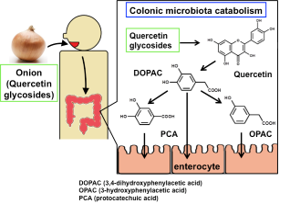Example
Activation of endogenous defense mechanisms by functional food constituents and their metabolites by gut microbiota
Social background
With the advent of the super-aging society, it has been considered that improvement of dietary life is one of the effective strategies for promoting health and preventing disease. However, the scientific evidence and molecular basis are not yet established. In addition, due to the diversification of dietary habits, the amount of fruits and vegetables consumed in Japan is on a downward trend, whereas the consumption of meat is steadily increasing.
Purpose and overview of activities
In order to recommend the consumption of vegetables, it is essential to systematically clarify the relationship between the consumption of plant foods and human health. We have focused on the fact that bioavailability, i.e., the processes of absorption from the gastrointestinal tract, metabolism and excretion, and accumulation in the body, play a major role in the expression of the functions of food components. Using various approaches such as analytical chemistry, biochemistry, and molecular biology, we investigate the activation mechanisms of the endogenous defense system by functional food constituents as well as their intestinal bacterial metabolites. For example, we have shown that the catabolites of onion flavonoids produced by the intestinal microbiota activates endogenous antioxidant mechanisms, and identified the target molecules and downstream signaling pathways.
Expected effect
This research can contribute to understanding the molecular basis and establishing a scientific evidence of food and health and propose novel guidelines for the development of functional foods.

Representative
